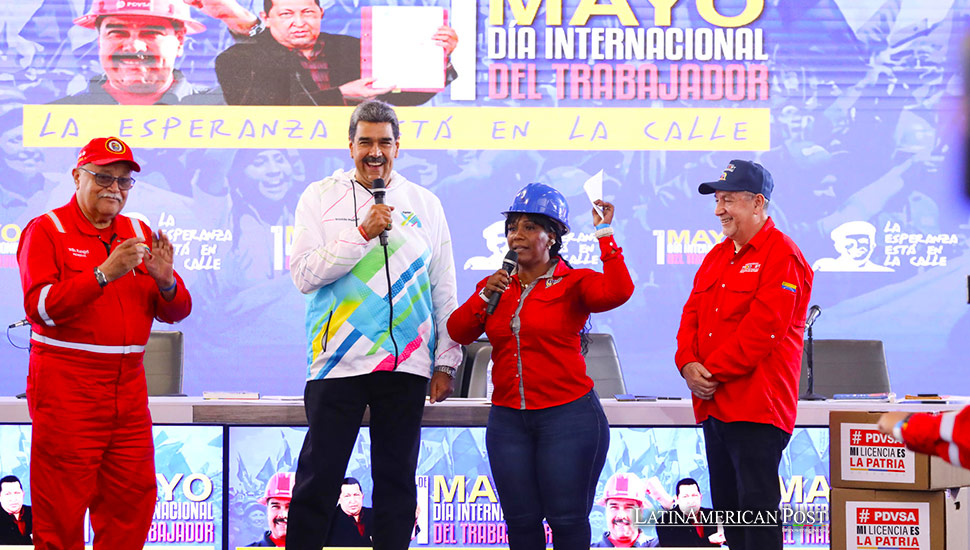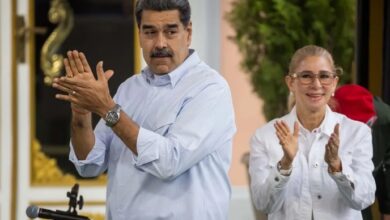Venezuela Boosts Public Sector Bonuses Amid Economic Strains

In response to severe inflation and upcoming presidential elections, Venezuelan President Nicolas Maduro announces a $130 monthly bonus for public employees, intensifying efforts to stabilize the nation’s struggling economy.
Amid rising inflation and mounting worker demands for wage increases, Venezuelan President Nicolas Maduro has announced a significant increase in monthly bonuses for public employees, setting the stage for his campaign as he seeks a third term in office. This move comes at a critical time for Venezuela, which has been grappling with economic challenges and political tensions for years.
Striving to Offset Inflation: Maduro’s Bonus Announcement
During a speech commemorating International Workers’ Day, Maduro revealed that public sector workers would receive $130 monthly bonuses, distributed as a $90 “Bonus Against Economic War” and a $40 food bonus. According to ruling party lawmaker Francisco Torrealba, these bonuses will be paid in the local currency, bolivars, but pegged to the U.S. dollar amounts to protect against Venezuela’s rampant inflation.
The announcement highlights the government’s struggle to keep public wages in line with the cost of living, which has soared due to hyperinflation. Official figures reported a 67.75% annual increase in consumer prices through March, continuing a trend of double- and triple-digit inflation rates that have eroded purchasing power and deepened economic disparities.
Venezuela’s minimum wage is 130 monthly bolivars, roughly equivalent to $3.5 based on the official exchange rate. This rate has remained unchanged since March 2022, though the government has periodically issued bonuses to supplement incomes in the public sector. Before this latest increase, bonuses were last adjusted in February to $100.
The economic backdrop of these wage adjustments is dire. The cost of basic food for a family far exceeds the total monthly income of most workers, with the teachers’ union estimating it at over $500. This discrepancy has spurred repeated calls from unions representing teachers, university professors, healthcare workers, and other public sectors for salary adjustments that accurately reflect the rising cost of living.
Political Strategy or Genuine Relief?
Maduro’s government has pledged to tackle inflation aggressively, aiming to bring it down to two digits and increase social spending as the presidential elections approach. This strategy is seen as an attempt to regain public trust and stabilize the economy, which has suffered under the weight of international sanctions, mismanagement, and a decline in oil revenue.
However, the effectiveness of these bonuses in alleviating Venezuelans’ economic hardship is up for debate. While they provide temporary relief, they do not address the underlying issues of hyperinflation, currency devaluation, and financial mismanagement that have plagued the country for years.
Economists and political analysts view the bonus increase as a strategic move by Maduro to bolster his support base ahead of the elections. By increasing disposable income for public employees, the government hopes to project an image of taking proactive steps to improve economic conditions despite the broader context of a struggling economy.
Calls for Comprehensive Reforms
Critics argue that such measures, while helpful in the short term, are insufficient to solve Venezuela’s deeper economic problems. They advocate for more comprehensive economic reforms, transparency in governance, and an overhaul of monetary policies to restore growth and stability.
Venezuela’s economic strategies are closely watched internationally, as the country plays a significant role in Latin American politics and the global oil market. The outcome of the upcoming elections and the effectiveness of Maduro’s economic policies will have implications for Venezuela and its neighbors and international partners.
Also read: Venezuela’s Food Basket Crisis: A Deepening Economic Divide
As Venezuelans navigate these challenging economic waters, the government’s next steps will determine the country’s path forward. Whether these bonuses will be enough to satisfy the public’s demands and stabilize the economy or merely serve as a temporary palliative remains to be seen. What is clear, however, is that the Venezuelan public is eager for lasting solutions to their ongoing economic crisis.




